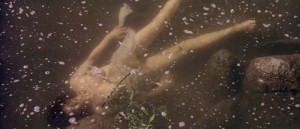
- The greatest accomplishment of this film is how it seeks to surprise its viewers, not just with what happens but with where we place our loyalty.

Short Cuts (1993)
Directed by Robert Altman
United States – 187 min. Color
Criterion Spine #265
The Criteron Collection’s two-disc issue of Robert Altman’s 1993 film Short Cuts comes with a book of short stories – nine stories and a poem, to be exact – by the late American writer Raymond Carver, whose writings served as the launchpoint for the film. There is much different between the sad-tragic vignettes you read in the book and the sprawling sad-tragic stories you watch on the DVD. Pristine is not the word to describe this adaptation, but it is nevertheless nimble and faithful and, although the film’s success goes to Altman and his co-screenwriter Frank Barhydt, what a tribute it is to Carver who, were he alive when the film was released, would no doubt watch it and recognize his own face.
There is so much humanity in a film like Short Cuts that it is difficult to describe what happens without undermining its epic quality. I describe it as ‘epic’ for though it is a film rich in minutiae that deals with all occurrences small and still, it is as complex and surprising as life itself. I imagine watching it would be very much like picking a random stranger off the morning commute and going through their underwear drawer. What deviance lies behind the mundane, what pettiness goes on behind closed doors and what generosity and empathy can be found in such unexpected places? Take, for instance, the story of a Jazz singer and her cellist daughter (Annie Ross and Lori Singer), who would rather escape in booze and music than get to know each other. Or the story of the Finnigans (Andie MacDowell and Bruce Davison), so at a loss as to how their son (Zane Cassidy) could be hit by a car when they did everything to protect and love him – when they did everything, to their thinking, right. Altman films each of the interlocking stories with an intimate distance, often covering scenes with a roaming master shot over conventional coverage to put you in the moment, to sit you in the hospital lobby or in the Jazz club or any of the other dozens of locales filled with any of the twenty-two major characters, watching as these perfect strangers go through the motions of being inescapably human.
 When the film was released, Altman got a lot of flack from Carver purists for what they thought was a too-liberal translation of the stories. Watching any of the informative, if slightly dry, Carver docs on the supplements disc gives you a sense that although these two artists never actually sat down with each other to hash out script ideas they were very much on the same page on the theme of luck and how waking up in the morning and hitting someone with your car amount to the same action in the plot of the everyday. There is also a feature-length making-of documentary, filled with candid moments from the actors and director and even Carver’s widow, Tess Gallagher, that shows what love the stories and characters were given, what empathy shown for these fictional people. The cast doesn’t have a weak link, and watching the actors’ interviews, you can tell that a lot of this has to do with their trust in Altman and the truth they found in Carver’s writings. This movie, it seemed, was more than a labour of love. It was a labour of respect and tribute to a writer who understood what it meant to wake up, go to work, go to bed and do it all again, facing the mean and the generous all in one breath.
When the film was released, Altman got a lot of flack from Carver purists for what they thought was a too-liberal translation of the stories. Watching any of the informative, if slightly dry, Carver docs on the supplements disc gives you a sense that although these two artists never actually sat down with each other to hash out script ideas they were very much on the same page on the theme of luck and how waking up in the morning and hitting someone with your car amount to the same action in the plot of the everyday. There is also a feature-length making-of documentary, filled with candid moments from the actors and director and even Carver’s widow, Tess Gallagher, that shows what love the stories and characters were given, what empathy shown for these fictional people. The cast doesn’t have a weak link, and watching the actors’ interviews, you can tell that a lot of this has to do with their trust in Altman and the truth they found in Carver’s writings. This movie, it seemed, was more than a labour of love. It was a labour of respect and tribute to a writer who understood what it meant to wake up, go to work, go to bed and do it all again, facing the mean and the generous all in one breath.
 I think the greatest accomplishment of this film is how it seeks to surprise its viewers, not just with what happens but with where we place our loyalty. It is a credit to both Altman and Carver that we can watch these people, with their eccentric flaws and self-absorbed displays of affections, and still be in their corner when they are cruel or weak. Their lives are not our own but they function on the same laws, so there is never anything that is out-and-out inexplicable; things just happen to them and they react. In the introduction to the aforementioned book of stories, Altman writes that he could’ve made this film longer, that the characters and their lives and their stories could continue to fill a great many feature-length films. That he didn’t expand, that he ended where he did, gives us the opportunity to fill in the blanks and let these characters linger in possibility – and linger they do.
I think the greatest accomplishment of this film is how it seeks to surprise its viewers, not just with what happens but with where we place our loyalty. It is a credit to both Altman and Carver that we can watch these people, with their eccentric flaws and self-absorbed displays of affections, and still be in their corner when they are cruel or weak. Their lives are not our own but they function on the same laws, so there is never anything that is out-and-out inexplicable; things just happen to them and they react. In the introduction to the aforementioned book of stories, Altman writes that he could’ve made this film longer, that the characters and their lives and their stories could continue to fill a great many feature-length films. That he didn’t expand, that he ended where he did, gives us the opportunity to fill in the blanks and let these characters linger in possibility – and linger they do.
– Lena Duong

Visit the Criterion Collection website
